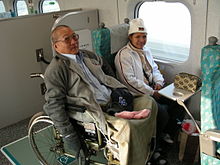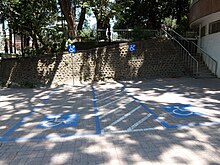| This article's lead section may be too short to adequately summarize the key points. Please consider expanding the lead to provide an accessible overview of all important aspects of the article. (November 2017) |
As of 2007, there are almost one million people with various levels of physical and mental disabilities in Taiwan. Taiwan adopted a universal healthcare system in 1995 to properly support patient care and provide more transparent access to its people, including those who identify as disabled. Taiwan is a nation that has grown tremendously to support those that are disabled. This includes having a socialized form of medical care that is run by the Executive Yuan. Overall this universal scheme includes the law, public facilities, and educational aspect of healthcare. Taiwan also has different aspects of healthcare to effectively support those that are disadvantaged or disabled, this included subsidies, loans, plans, service guarantee and specific care for medically vulnerable populations. Taiwan's healthcare development and dedication to support its people plays an important role in its transformation of benefits for disabled people.
History
Prior to the 1980s, the term referring to people with disabilities translated to "useless and worthless disability". The government was not responsible for providing supporting or funding those with disabilities. Families and non-profit, private organizations were responsible for supporting disabled people. However, institutions were not regulated, as some were inhumane and the quality of service, questionable. However, as Taiwan underwent industrialization, mothers were forced to enter the work force and could no longer support their children with disabilities. The once-questionable facilities were forced to reform and become suitable for taking care children with disabilities. In addition, in 1975, the United Nations released the "Declaration of the Rights of Disabled Persons" which forced the government to reform their original disability policy. Taiwanese disability policies became heavily influenced by international disability laws and regulations. From the first disability policy reform to 2007, a medical model became the standard for disability evaluation.

Law
In 1980, the Taiwanese Welfare Law for the Handicapped and Disabled was enacted which listed all types off disabilities disabled. In 2006, Taiwan adopted the Convention on the Rights of Persons with Disabilities to upholds its human rights protection for people with disabilities. Disabilities Rights Protection Act was enacted in July 2007. Taiwan Accessibility Building Code was amended in 2008 for buildings to provide more access for disabled people. Public Officials Election and Recall Law was amended on 26 November 2008 to ensure any polling place is barrier-free venue or equipped with tools or additional facilities if such venue does not exist.
Benefits
Disabled people in Taiwan (excluding disabled people with foreign nationality) are entitled to receive subsidies, benefits, house value-added tax rebate and income tax rebate depending on their level of disability.
Employment
Any employer shall not discriminate against any disabled candidates or refusing employment due to their disability. Private companies must employ at least one person with disability for every 67 person employed. As of September 1998, Lienchiang County has the best performance of meeting this employment quota among all municipalities, cities or counties in Taiwan. Unemployment among disabled people in Taiwan is 14.7%, triple of the amount of those general population which is 4.99%.
Public facilities


Transportation
Air
Airports provide personnel to assist disabled people free of charge throughout the entire journey from check-in until baggage reclaim.
Rail
All of the metro, subway and high speed rail in Taiwan are equipped with accessibility for disabled people.
Road
New public buses in Taipei are equipped with wheelchair access and designated areas. Most of traffic lights are equipped with audible signal for visually impaired people.
Elections
Polling places are fitted with barrier-free access. In the event of unavailability of such facility, then relevant tool are used to help disabled people cast their ballots.
Education
According to the Population of People with Disability Report, 107,450 elementary and middle school students or 3% of the total number of elementary and middle school students are students with disabilities. After the adoption of the Functioning Scale of the Disability Evaluation System---Child Version (FUNDES-Child) in 2007, the focus on child disability shifted. FUNDES-CHILD was developed with the intention of locating children in the nation for the introduction of a new service policy developed according to the framework of the International Classification of Functioning, Disability and Health: Children and Youth Version. The definition of disability was refined to include more than health and body impairment related disabilities. In a study to identify the children and the gap between independence and frequency, in which independence means the capability of a child or what they "can do" which the frequency pertains to the extent to which they can carry out a task or what a child "does do", the children with mild severity in Taiwan showed more frequency restrictions. In another study, children with intellectual disability showed more signs of "aggression, self-injurious behavior or physical complaints" but not signs of "depression and anxiety complaints."
Policies
There are separate policies for children and adults. One of the policies for students with disabilities is the Taiwan Special Education Act of 2013 to provide special education laws. Before the Taiwan Special Education Act of 2013, there was The First Children's Development Center founded in 1981 for students with intellectual disabilities. However, there are no regulations for children under the age of 2, as regulations only allow school age students to utilize special education services. Educational institutions are required to accommodate and meet the needs of all students, providing the necessary accommodations, assistive technology and accessible campus. Another policy that pertains to children with disabilities is the Taiwan People with Disabilities Rights Protection Act of 2013. Children are protected from anti-discrimination statute. Through the increased human-rights advocacy and the civil rights movement for disabilities, Taiwan has been improving disability rights by creating more inclusive communities and increasing opportunities for students with disabilities.
Schools

There are 20 special schools in Taiwan dedicated for students who are blind, deaf, physically disabled, or intellectually disabled. Students are either take bus or live within the school compounds. Those with severe disabilities, visiting teachers will visit them to hospitals or homes.
Budget
As of 1999, budget for special education by the Ministry of Education is NT$3.58 billion. The ministry also subsidizes private charity organizations that help disabled people.
Organizations
Non-profit organizations in Taiwan that promotes the awareness and help for disabled people are:
- Children Are Us Foundation
- Taiwan Access for All Association
- United Way of Taiwan, founded in 1990
See also
References
- ^ "Creating Employment Opportunities for People with Disabilities". United Way of Taiwan. Archived from the original on 7 November 2017. Retrieved 3 November 2017.
- Wu, Tai-Yin; Majeed, Azeem; Kuo, Ken N (2010–2012). "An overview of the healthcare system in Taiwan". London Journal of Primary Care. 3 (2): 115–119. doi:10.1080/17571472.2010.11493315. ISSN 1757-1472. PMC 3960712. PMID 25949636.
- "Executive Yuan, R.O.C. (Taiwan)-Structure & Functions". Executive Yuan, R.O.C. (Taiwan) (in Chinese (Taiwan)). December 2011. Retrieved 2018-12-02.
- "National Health Insurance Annual Report" (PDF).
- ^ Chang, Heng-hao (2014-12-02). "Social Change and the Disability Rights Movement in Taiwan 1981-2002". Review of Disability Studies. 3 (1 & 2). ISSN 1552-9215.
- ^ Chiu, Chun-Yu; Turnbull, H. Rutherford (2014-09-01). "Taiwan's National Policies for Children in Special Education: Comparison with UNCRPD, Core Concepts, and the American IDEA". Journal of Policy and Practice in Intellectual Disabilities. 11 (3): 217–225. doi:10.1111/jppi.12086. ISSN 1741-1130.
- ^ "Helping the Disabled Is Helping Ourselves". Taiwan Today. 1 January 1999. Retrieved 3 November 2017.
- Chen, Wei-ting; Hsu, Elizabeth (3 November 2017). "Taiwan's protection of rights for the disabled fall short: expert". Focus Taiwan. Retrieved 4 November 2017.
- ^ "People With Disabilities". Angloinfo. Retrieved 3 November 2017.
- Hsu, Jacky; Chen, Ming-de. "TAIWAN: Advocates work for accessible trails". American Trails. Archived from the original on 7 November 2017. Retrieved 3 November 2017.
- Zeldin, Wendy (8 December 2008). "Taiwan: Election Law Amended to Provide Disabled Better Polling Station Access". Library of Congress. Retrieved 3 November 2017.
- "Accessible Elevator". Taiwan Railways Administration. 11 December 2008. Archived from the original on 7 November 2017. Retrieved 3 November 2017.
- ^ Hwang, Ai-Wen; Yen, Chia-Feng; Liou, Tsan-Hon; Simeonsson, Rune J.; Chi, Wen-Chou; Lollar, Donald J.; Liao, Hua-Fang; Kang, Lin-Ju; Wu, Ting-Fang (2015-05-11). "Participation of Children with Disabilities in Taiwan: The Gap between Independence and Frequency". PLOS ONE. 10 (5): e0126693. Bibcode:2015PLoSO..1026693H. doi:10.1371/journal.pone.0126693. ISSN 1932-6203. PMC 4427311. PMID 25962175.
- Lin, J. D.; Yen, C. F.; Li, C. W.; Wu, J. L. (2005-01-01). "Health, healthcare utilization and psychiatric disorder in people with intellectual disability in Taiwan". Journal of Intellectual Disability Research. 49 (1): 86–94. doi:10.1111/j.1365-2788.2005.00664.x. ISSN 1365-2788. PMID 15634315.
- "Taiwan Access for All Association". Duofu. Retrieved 3 November 2017.
- "About Us". United Way of Taiwan. Archived from the original on 7 November 2017. Retrieved 3 November 2017.